The Buncombe County Board of Commissioners will hear budget requests from Asheville City Schools and A-B Tech during its meeting on Tuesday, May 2.
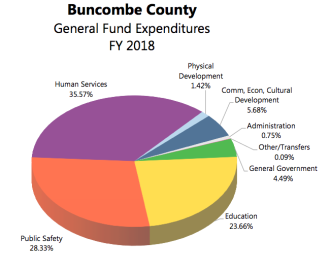

The Buncombe County Board of Commissioners will hear budget requests from Asheville City Schools and A-B Tech during its meeting on Tuesday, May 2.

“This is a remarkable environmental success story! Many agencies and organizations can be proud of their contributions to this. Together, they’ve demonstrated that bold action at many different levels can successfully address serious environmental issues.”

Duke Energy’s plan to bring smart meters to the mountains could put two key concerns — energy conservation and human health — into a head-on collision, critics say.
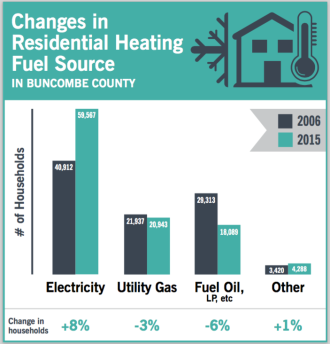
Using data provided by Duke Energy, a local task force has shown that much of the growth in WNC’s peak electrical demand is driven by the conversion of existing oil- and propane-fired heating systems to electric heat pumps. Slowing the growth in peak demand is the mission of the task force, which hopes to delay or eliminate the need for one of three new power plants proposed for Duke Energy’s Lake Julian station.
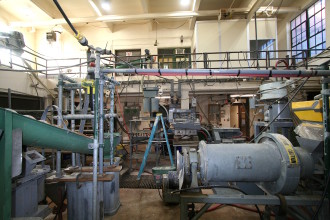
For 70 years, the Minerals Research Laboratory on Coxe Avenue has collaborated with mining companies and educational institutions to develop more efficient processes for extracting the state’s mineral resources as well as ways to reuse potentially harmful byproducts.

On Jan. 10., Asheville City Council approved the free downtown shuttle service offered by Slidr, a request to voluntarily annex a 4.8-acre parcel in South Asheville and an amendment to the zoning approval for the RAD Lofts housing development on Roberts Street. Council also agreed to move forward with a study of voters’ attitudes about district elections for positions on City Council.

“The Big Energy companies that put forth politicians to push pillaging and polluting practices use ‘moral/religious’ issues as a means to divide people.”
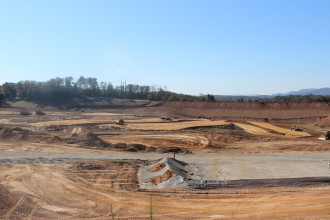
Duke Energy operating personnel and communications representatives proudly showed off the newly excavated 82 basin at the company’s Lake Julian power plant to local media on Tuesday, Oct. 25. The former coal ash pond is now being readied for its next act: the site of the utility’s new natural gas-fired plant, which is scheduled to begin operations in 2020.

“A 68/78 campaign could easily be started in government offices, schools and through Leadership Asheville.”
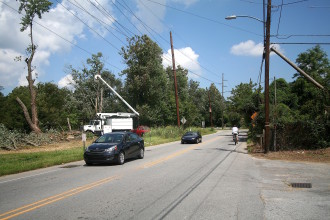
Residents commuting down Lyman Street and Riverside Drive have most likely noticed some serious changes to the tree line around 12 Bones. Work crews have been busy removing trees from the area, a project that is expected to continue through the fall. “I’ve been out of office almost 15 years, and I’ve gotten several calls […]

“If the Western Carolinas Modernization and Expansion project was truly a ‘modernization’ project, then Duke Energy Progress would not be trying to cram 100-year-old, air-cooled, ugly substations into the downtown urban core.”
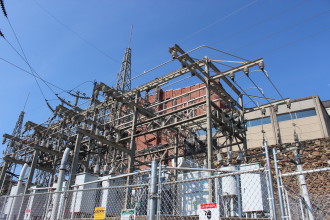
To meet growing power demand, Duke Energy says it will need to build three new electrical substations close to downtown over the next ten years. The city is rushing to put an ordinance establishing requirements for substation screening in place while residents are banding together to oppose substations in their neighborhoods.
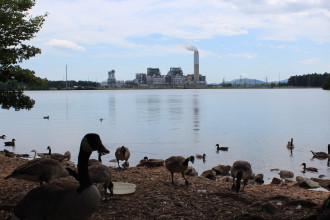
With the close of the 2016 session of the North Carolina General Assembly, homeowners and environmental advocates are scrambling to make sense of new legislation on coal ash ponds. How will the new rules affect the cleanup of coal ash ponds at Duke Energy’s Lake Julian plant, as well as homeowners who believe their wells have been contaminated by the ponds?
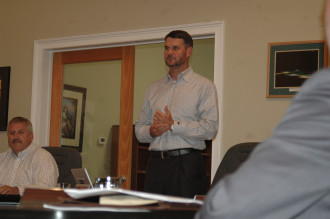
On Monday, July 11, the Western North Carolina Air Quality Agency renewed Duke Energy Progress’ Title V permit for its Lake Julian coal plant facility. This type of operating permit is regulated under the federal Clean Air Act and must be renewed every five years by most businesses whose facilities emit hazardous air pollutants, whether […]
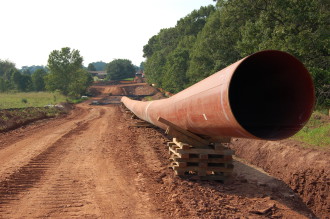
Natural gas will dethrone coal as the fossil fuel generating most of WNC’s electricity when Duke Energy’s new Lake Julian plant goes online in 2020. But how does natural gas get to this area, and where does it come from? Though tracing the gas molecules to their source is tricky, Xpress found that much of the area’s gas supply comes from hydraulic fracturing, and new pipeline projects are in the works to bring more fracked gas into the region.

The second meeting of the Buncombe County Energy Innovation Task Force focused on setting up working groups that will focus on four key areas: community programs, technical solutions, community engagement and communication and peak demand reduction.

The new Energy Innovation Task Force — which brings together representatives from electric utility Duke Energy, elected officials, the private sector, nonprofits and alternative energy providers — held its first meeting on May 13. In addition to the task force members, a sizable group of citizens and energy advocates also turned out for the public kickoff of the one-of-a-kind initiative, which aims to slow the growth of local energy demand and avoid the construction of a third natural gas generator.

Despite some economic gains the state has made since he took office as North Carolina’s governor in 2013, Pat McCrory isn’t a popular guy with those on the left. In conjunction with McCrory’s planned Governor’s Western Residence open house on Saturday, May 14, a broad spectrum of social and environmental advocacy groups plan to protest legislation McCrory has signed. […]

At its April 26 meeting, City Council approved a rezoning request and committed $4.2 million in city funds to allow the Lee Walker Heights redevelopment project to move forward. Council also approved a Memorandum of Understanding with Duke Energy which gives the city the option to purchase the former Matthews Ford property adjacent to Lee Walker Heights at any time over the next eight years.

Another issue that put the commissioners’ divide on display was a resolution concerning the creation of a Utility Energy Innovation Task Force. The venture is a partnership with Duke Energy and the City of Asheville aimed at, “working to delay or avoid the construction of an additional fossil fuel powered combustion turbine electricity generating facility at the Asheville Plant site in 2023.”
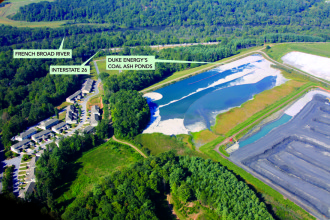
Jeri Cruz says people and animals in her Buncombe County neighborhood are getting sick at such an alarming rate that she suspects a connection to contaminants found in their well water. Meanwhile, Duke suggests nature, not coal ash, is the source of the substances found in well water.